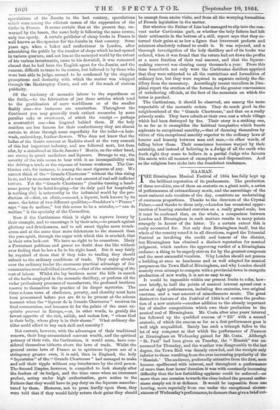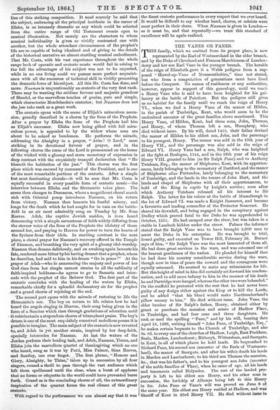NAAMAN.
THE Birmingham Musical Festival of 1864 has fully kept up the brilliant reputation of its predecessors. The production of three novelties, one of them an oratorio on a giant scale, a series of performances of extraordinary merit, and the assemblage of the most eminent solo vocalists of the day, constitute an undertaking of enormous proportions. Thanks to the directors of the Crystal Palace,—and thanks to them only,—London has occasional oppor- tunities of hearing standard oratorios on a really grand scale, but it must be confessed that, on the whole, a comparison between London and Birmingham in such matters results in many points strangely in favour of the latter. To a certain extent this is easily accounted for. Not only does Birmingham itself, but the whole of the country round it in all directions, regard the Triennial Festival as involving the credit and honour of the district, but Birmingham has obtained a distinct reputation for musical judgment, which renders the approving verdict of a Birmingham audience a thing to be eagerly striven for by the greatest composers and the most successful vocalists. Why London should not possess a building at once as handsome and as well adapted for musical purposes as the Town Hall of Birmingham, and why London should scarcely even attempt to compete with a provincial town in energetic production of new works, it is not so easy to say.
It would be impossible within our present limits to refer, how- ever briefly, to half the points of musical interest spread over a series of eight performances, including five oratorios, two original cantatas, and a vast amount of miscellaneous music. The great distinctive feature of the Festival of 1864 is of course the produc- tion of a new oratorio—another addition to the already important list of similar compositions which owe their production to the musical zeal of Birmingham. Mr. Costa after nine years interval has followed up the qualified success of " Eli" with a second oratorio, of which the success as far as a first performance goes is well nigh unqualified. Rarely has such a triumph fallen to the lot of any composer as that which the performance of Naaman at Birmingham on Wednesday gained for Mr. Costa. Although " St. Paul" had been given on Tuesday, the " Messiah" was an- nounced for Thursday, and the weather was disagreeable to the last degree, the Town Hall was densely crowded, and the receipts only inferior to those resulting from the ever increasing popularity of the "Messiah." The audience, profoundly attentive from the first, soon became spellbound with interest, and throughout a performance of more than four hours' duration it was with constantly increasing difficulty that the law forbidding applause could be enforced—on more than one occasion towards the close indeed the general enthu- siasm simply set it at defiance. It would be impossible from one hearing, more especially from one under the exceptional circum- stances of Wednesday's performance, to do more than give a brief out-
line of this striking composition. It need scarcely be said that the subject, embracing all the principal incidents in the career of Elisha, is as intensely dramatic as any which could be selected from the entire range of Old Testament events open to musical illustration. Not merely are the characters to whom musical individuality is given so vividly contrasted one with another, but the whole attendant circumstances of the prophet's life are so capable of being idealized and of giving to the details of the historical narrative an almost startling musical embodiment. That Mr. Costa, with his vast experience throughout the whole range both of operatic and oratorio music would fail in seizing to the full the advantages of his subject was not to be expected, while in no one living could we possess more perfect acquaint- ance with all the resources of technical skill in vividly presenting the dramatic force of his subject. All this Mr. Costa has done, and more. Naaman is unquestionably an oratorio of the very first rank. There may be wanting the sublime fervour and majestic grandeur of Handel, or the marvellous touches of genius, pure and simple, which characterize Mendelssohn's oratorios ; but Naaman does not the leas take rank as a great work.
The oratorio opens with the scene of Elijah's miraculous ascen- sion, grandly described in a chorus by the Sons of the Prophets. After a prayer by Elisha the Sons of the Prophets hail him as Elijah's successor. Elisha now being gifted with full mira- culous power, is appealed to by the widow whose sons are about to be seized as bondsmen. He performs the miracle, addressing the Almighty in a prayer, " Arise ! 0 Lord," most striking in its devotional fervour of prayer, and in the following chorus the curse of the Lord is pronounced on the house of the wicked with a gloomy and stern monotony of expression in -deep contrast with the exquisitely tranquil declaration that " He blesseth the habitation of the just." This chorus was the first piece which was encored by command of the President, and is one of the most remarkable portions of the oratorio. After a simple but most fascinating chorale—it will be seen that Mr. Costa is equally successful in every possible form of oratorio music—the interview between Elisha and the Shunamite takes place. The acme then changes to Damascus, where a magnificent choral march rich with Oriental pomp introduces Naaman, on his return from victory. Naaman then laments his fearful misery, and longs for the death which he had sought for in vain on the battle- field in an air most admirably sung on Tuesday by Mr. Sims Reeves. Adah, the captive Jewish maiden, is then heard denouncing with a simple earnestness of faith widely differing from the sterner voice of the Sons of the Prophets the idolatry of those around her, and praying to Heaven for power to turn the hearts of the Syrians from their idols. In startling contrast is the next piece, a choral prayer for Naaman's recovery offered in the Temple of Rimmon, and breathing the very spirit of a gloomy idol-worship. }Tasman then dreams deliriously, and on awaking again laments his fate, rendered more bitter by his having dreamt that a prophet, whom he describes, had said to him in his dream " Go in peace !" At the prayer of Adah—who in announcing the majesty and power of her God rises from her simple earnest strains to all the sublimity of faith-inspired boldness—he agrees to go to Samaria and inter- cede with the prophet of the Hebrew God. The first part of the -oratorio concludes with the healing of the waters by Elisha, remarkable chiefly for a splendid declamatory air for the prophet -and a grand chorus of rejoicing at the end.
The second part opens with the miracle of restoring to life the Shunamite's son. The boy on return to life relates how he had heard the angels singing in Heaven, their song being given in the form of a Sanctus which rises through gradations of adoration until - fit culminates in a stupendous chorus of triumphant praise. The boy's dream is one of the most exquisitely conceived melodious poems it is possible to imagine. The main subject of the oratorio is now reverted to, and Adah in yet another strain, inspired by her deep faith, :specially intercedes for Naaman. At last the waters of the Jordan perform their healing task, and Adah, Naaman, Timna, and Elisha join the marvellous quartet of thanksgiving which no one who heard, sung as it was by Patti, Miss Palmer, Sims Reeves, and Santley, can ever forget. The first phrase, " Honour and Glory, Almighty, be Thine," taken up in succession by all four singers, caused a thrill to pass through the vast audience which left them spellbound until the close, when a burst of applause that no forms or etiquette in the world could have prevented burst forth. Grand as is the concluding chorus of all, the extraordinary inspiration of the quartet forms the real climax of this great oratorio.
With regard to the performance we can almost say that it was the finest oratorio performance in every respect that we ever heard. It would be difficult to say whether band, chorus, or soloists were most perfect in their share. When Naaman is given in London— as it must be, and that repeatedly—we trust this standard of excellence will be again realized.































 Previous page
Previous page